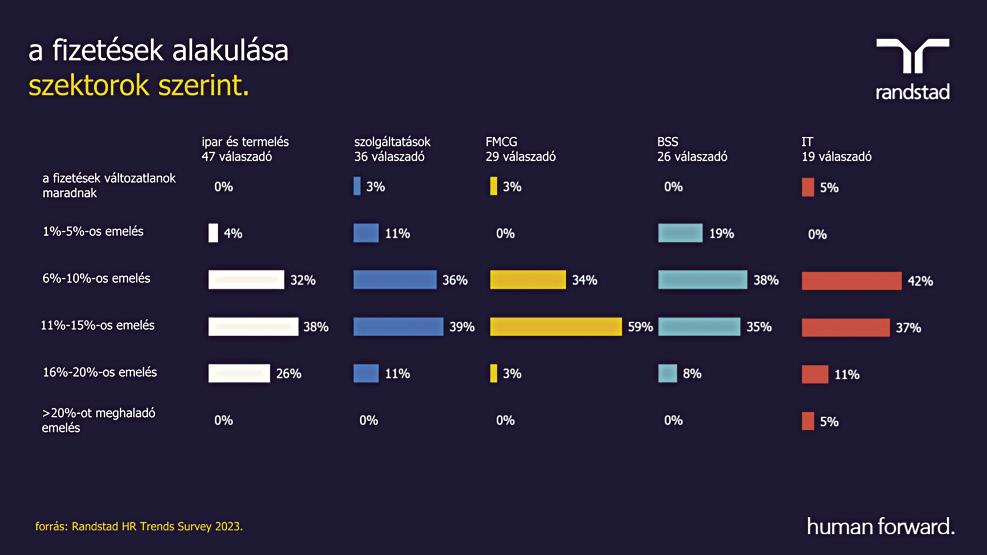Do salaries follow the inflation in the food industry?

Guest writer:
Sándor Baja
managing director
Randstad Hungary
In February 2023 Randstad published a study, for which they interviewed the heads of 246 companies about how the different sectors are doing and what the salary trends are. In January the inflation was 25.7% in Hungary, but the 44% food price increase was even more depressing. As a matter of fact it is weird to read articles that blame Pick for the famous Szeged salami being cheaper in Germany than in Hungary, as we know it very well that the VAT on every food product is 7% in Germany and 27% for salami in Hungary.
Inflation’s impact
Obviously there is inflation in other countries too, for instance it is 10% in the eurozone, but what really hurts is that the currencies of neighbouring countries (the leu in Romania and the koruna in the Czech Republic) aren’t weakening against the euro, and their inflation rates are 10 percentage points lower than in Hungary. During and after the Covid the Hungarian labour market was in the positive, as the crisis was deeper in Western Europe and the bounce back was slower there, so more people came home than went abroad. Unfortunately this trend took a U-turn with the weak forint, to the extent that it is already worth working in Romania and Slovakia for Hungarian workers.
What can the FMCG sector expect?
Last year 61% of Hungarian companies calculated with sales revenue growth, but by 2023 this dropped to 41%; in the food industry this ratio was 38%. From the firms that forecast growth for themselves 22% think their revenues will be up 15% or more. In the food industry none of the respondents think their business performance will improve by 15% or more. 17% of food businesses calculate with a contraction as opposed to the 10% national average. In 2022 89% of Hungarian firms planned to recruit new workers, but in 2023 only 34% intend to do so, and this proportion is just 10% in the food industry. 40% of companies are recruiting IT professionals and engineers.

Salary increase
In 2022 83% of companies increased the salaries of their workers, and this year this proportion is up at 97%. None of the FMCG companies interviewed plan to give a pay raise bigger than 20%; 59% of them will increase salaries by 11-15%. It is noteworthy that 43% of companies raised salaries for a second time too in 2022, compensating for the rapidly growing inflation. It seems that firms are unable or don’t wish to follow the more than 25% inflation with worker salaries. Right now the prices are growing faster than salaries, but let’s hope that just like we have managed to strengthen the forint, we will be able to break the inflation. If not, workers will see their quality of life sink faster than any time in the recent past. //
Five days in four days?
83% of firms don’t want to introduce a 4 working day week, and only 13% are considering a test run. 3% will introduce the 4-day week and 1% have already done so. I don’t really see how this can work in the present situation: obviously workers will never do as much in 4 days as in 5 days. Hungarian employers have already expressed their opinion by cutting back home office work… //
This article is available for reading in Trade magazin 2023/4.
Related news
KSH: industrial production decreased by 0.2 percent in October
In October, the volume of industrial production fell by 0.2…
Read more >Can the lending boom continue next year?
The volume of retail loan agreements this year could even…
Read more >Prices rose by 3.7% in November
Following a 3.2% year-on-year increase in October, consumer prices in…
Read more >Related news
Most major grocery chains will keep their stores open until noon on December 24th
Most of the large grocery chains will keep their stores…
Read more >Recognition of Consumer Protection Excellence: Honoring the Best of 2024
This year’s outstanding consumer protection officers and special award recipients…
Read more >The Joy of Giving! – SPAR stores collect non-perishable food for people in need
The Hungarian Maltese Charity Service and SPAR Hungary have launched…
Read more >








